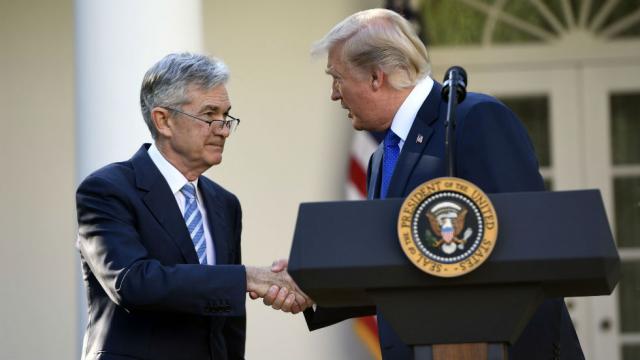
As widely anticipated, President Trump nominated Jerome “Jay” Powell to a four-year term as chairman of the Federal Reserve’s Board of Governors on Thursday, succeeding Janet Yellen.
Although Powell currently is a member of the board, serving a term that expires in 2028, he must separately be confirmed by the Senate as Fed chairman.
Yellen’s term as chairwoman expires on Feb. 3, but she can continue to serve as chairwoman if Powell has not been confirmed by that date.
Once Powell is confirmed as chairman, Yellen could continue serving as a member of the Board of Governors until her term as a board member expires in 2024. She will likely leave the board, though, when her term as chairwoman ends or upon Powell’s confirmation, whichever comes later.
Powell’s nomination concludes months of a very public, reality TV-like spectacle as to whom the president would appoint as Fed chairman. Thankfully, that unnecessary drama has come to an end.
Having served on the Board of Governors for over five years, Powell is intimately familiar with all aspects of Federal Reserve activities, notably monetary policy and banking supervision. He will not face a learning curve, but he will now be the leader of the Fed, not just a board member.
There is every reason to believe that under Powell’s leadership, the Fed will continue with the monetary policies launched by Yellen as the economy has continued to recover from the financial crisis — a gradual shrinkage of the Fed balance sheet coupled with a slow, cautious rise in interest rates.
At the same time, the Fed cannot become too complacent about the economy as the current economic expansion approaches a record length — 101 months and counting — especially given the various asset bubbles that exist today inflated by a prolonged period of excessively low interest rates. Those bubbles could start popping as rates rise.
Consequently, Powell and his fellow governors will need to be prepared to respond quickly to sudden adverse economic news.
Where the Powell Fed is likely to depart from the Yellen Fed is in the area of banking regulation, specifically in simplifying the rules mandated by the Dodd-Frank Act while trying to reduce the regulatory burden on smaller banks.
For those banks, regulatory compliance is much more expensive and a drain on management time, harming their competitiveness and impairing their ability to survive as independent institutions.
In this initiative, Powell will be backstopping Randal Quarles, a new Fed board member and vice chairman for banking supervision, a Fed board position created by Dodd-Frank. They worked together in the President George H.W. Bush Treasury Department and later at The Carlyle Group, a Washington-based asset management firm. So, they should have a good working relationship in improving bank supervision.
Simplifying regulatory rules, though, will require coordination with other regulators, notably the Treasury Department’s Comptroller of the Currency and the Federal Deposit Insurance Corporation, since banking regulations are adopted through a joint rule making process. That is seldom an easy or quick endeavor.
The Powell Fed also will participate in ongoing negotiations with the banking regulators of other nations through the international Basel Committee on Bank Supervision with regard to modifications in bank capital requirements and other rules especially important to U.S. banking companies with foreign activities.
These negotiations could become contentious if the United States tries to carve out too many exceptions for U.S. banks, especially community banks, without any foreign activities.
One interesting challenge facing the Fed are the number of vacancies on the seven-member Board of Governors — three at the moment and possibly four if Yellen resigns from the board before any of the present vacancies are filled.
How soon Trump will announce nominations to fill those positions is anyone’s guess, but one possible nominee is Stanford professor John Taylor, who was another finalist for the Fed chairmanship.
The big question now is how quickly the Senate will confirm Powell as the next Fed chairman and whether any Senator will try to block that confirmation.























